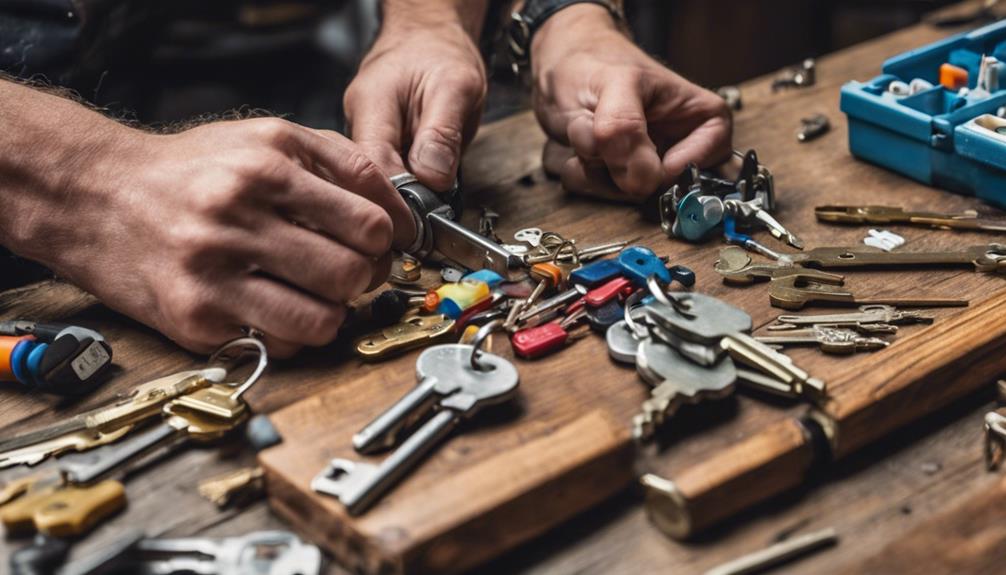Lock re-keying is a smart way to boost your security without the hassle of replacing entire locks. During this process, the internal pins of your lock are changed, allowing new keys to operate it while disabling old ones. It's a cost-effective solution, especially if you've lost your keys or are moving into a new home. The process is quick, often completed within an hour, and can be done by a professional or as a DIY project. If you're curious about the details of how it works and its benefits, you might find the following information useful.
Key Takeaways
- Lock re-keying changes the internal pins of a lock, allowing new keys to operate existing locks without full replacement.
- It is a cost-effective security solution ideal for lost keys or moving into a new home.
- The re-keying process involves disassembling the lock, replacing pins, and testing the new key for functionality.
- Re-keying enhances security by ensuring old keys no longer work, providing peace of mind to homeowners.
- Compared to lock replacement, re-keying is quicker, less labor-intensive, and typically more affordable.
Understanding Lock Re-Keying
Lock re-keying offers a practical solution to enhance your security without the need for full lock replacement. In fact, many homeowners prefer this method to avoid the costs associated with buying new locks and to maintain their existing hardware.
So, what's lock rekeying? It's the process of changing the internal pins of your existing locks, allowing a new key to operate them while rendering the old keys useless. This method is both efficient and cost-effective, particularly when you want to improve security without the hassle of buying new locks.
Unlocking savings through re-keying can also provide peace of mind.
The benefits of lock rekeying are numerous. It saves you money since you won't have to purchase new hardware, and it's quicker than changing locks entirely. Plus, you maintain the same level of convenience with your existing locks.
When considering rekeying vs changing locks, think about your specific needs. Rekeying is often ideal when you've lost keys or have recently moved into a new home and want to ascertain that previous occupants can't access your space.
The Re-Keying Process
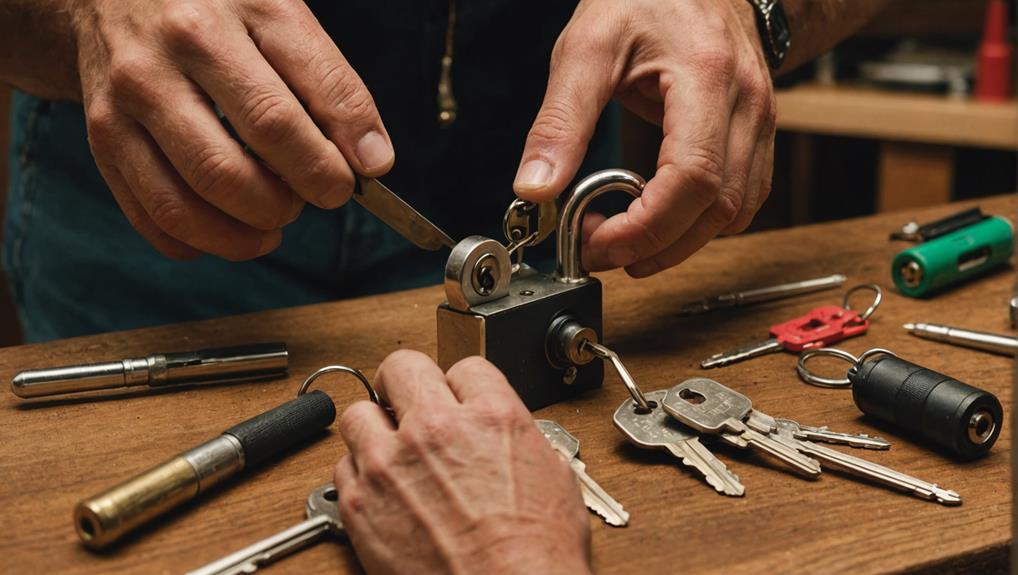
Re-keying your locks is a straightforward process that can greatly enhance your security.
It's a cost-effective alternative to replacing the entire lock, as it allows you to maintain your existing hardware while upgrading your key system.
If you're wondering how does rekeying work, it simply involves altering the internal mechanism of your lock so that it works with a new key.
This means old keys won't fit anymore, providing you peace of mind.
For more details, you can explore common challenges you might face during the re-keying process.
Here's a brief overview of the re-keying process:
- Disassemble the lock: Remove the lock cylinder from the door for easier access.
- Remove the pins: Take out the existing pins inside the lock, which correspond to your old key.
- Replace with new pins: Insert new pins that match the cuts on your new key. This is where lock rekeying is explained in detail.
- Reassemble the lock: Put everything back together and test the new key to guarantee it works smoothly.
Benefits of Lock Re-Keying
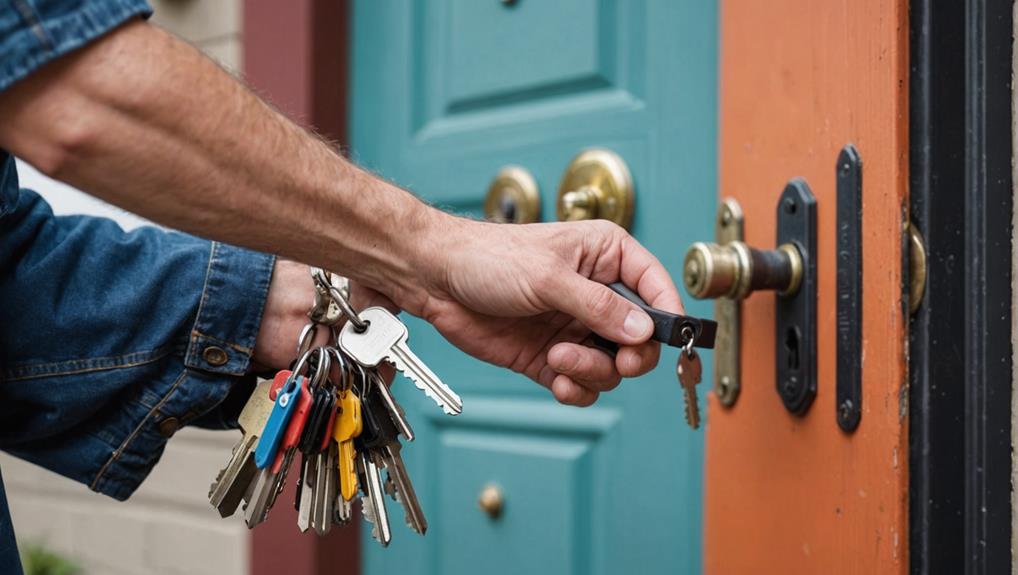
Why consider re-keying your locks? If you care about the safety and security of those you serve, re-keying offers numerous benefits. First and foremost, it enhances security. By changing the internal configuration of your locks, you guarantee that old keys no longer work, protecting your loved ones, clients, or community from potential threats.
Additionally, re-keying can be an effective solution to control access, especially in situations where keys may have been lost or given to unauthorized individuals, making it a wise choice for maintaining security in residential and commercial spaces comprehensive comparison of re-keying.
Re-keying is also cost-effective. Instead of replacing entire locks, which can be expensive, you can refresh your security at a fraction of the cost. This means you can allocate resources to other essential services or projects that matter to you and those you support.
Additionally, re-keying provides peace of mind. You'll feel more secure knowing that only those you trust have access to your spaces. This act of care not only protects your environment but also fosters trust with those you serve, reassuring them that their safety is a priority.
Lastly, re-keying is quick and convenient. A professional can usually complete the process in just a short amount of time, allowing you to focus on what truly matters—serving others effectively and compassionately.
When to Consider Re-Keying
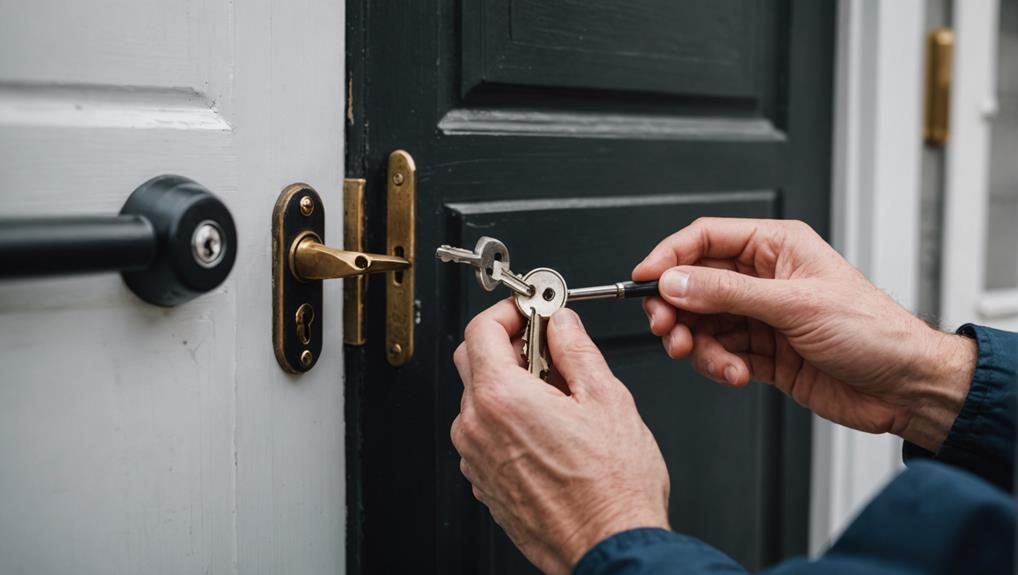
When to Contemplate Re-Keying
There are several key moments when you should contemplate re-keying your locks to maintain security and peace of mind.
Whether you're looking to protect your home or guarantee a safe environment for those around you, it's crucial to be proactive.
For instance, deciding between re-keying and lock replacement can greatly impact your security strategy.
Here are some situations to keep in mind:
- After moving into a new home: You don't know who might still have keys.
- If you've lost your keys: This could put your security at risk, and re-keying offers a fresh start.
- Following a breakup or separation: It's vital to feel secure in your own space.
- When you suspect unauthorized access: If you think someone might've copied your keys, it's time to act.
Re-keying your locks can be a simple yet effective way to enhance the safety of your environment.
By taking these steps, you not only protect yourself but also demonstrate care for those around you.
Remember, a secure home is a happy home, and your proactive choices can foster a sense of safety for everyone involved.
Don't hesitate to reach out to a professional locksmith for assistance in making your space more secure.
Comparing Re-Keying and Replacing
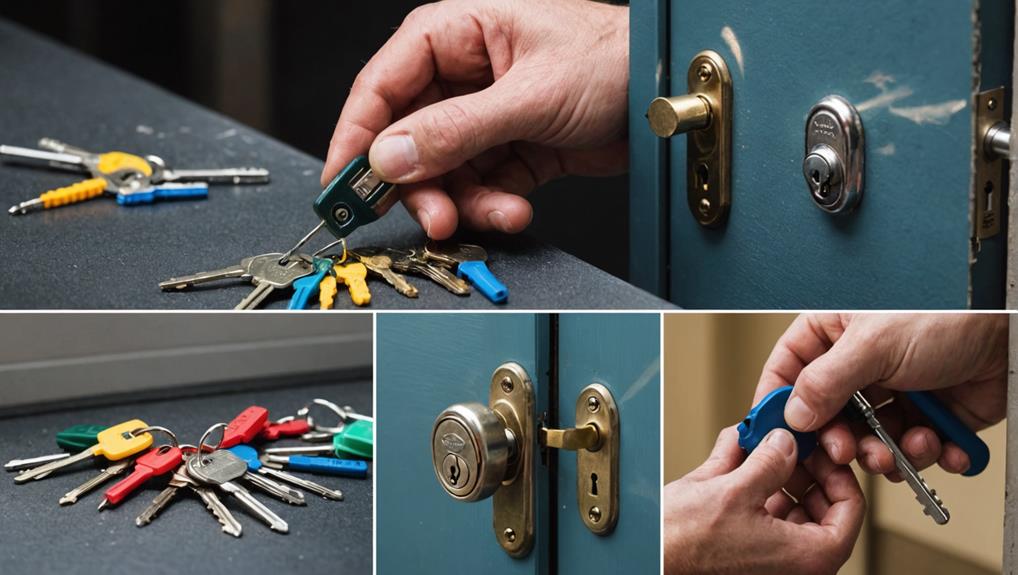
When you're deciding between re-keying and replacing your locks, it's crucial to weigh the cost differences, time required, and security considerations.
Re-keying often saves you money and time, while replacing locks could provide a fresh start regarding security.
Additionally, re-keying can enhance your security without the need for new hardware, making it a practical option for many homeowners security benefits and drawbacks.
Understanding these factors will help you make the best choice for your needs.
Cost Differences
Re-keying your locks is often a more affordable option compared to completely replacing them.
When you consider the costs involved, you'll find that re-keying can save you both money and hassle.
Here's a quick comparison of the two options:
- Re-keying typically costs less: You can often re-key your locks for a fraction of the price of new ones.
- Less labor intensive: Re-keying usually requires less time and effort from a locksmith, leading to lower service fees.
- No need for new hardware: With re-keying, you keep your existing locks, avoiding additional expenses for new hardware.
- Quick turnaround: Re-keying can often be done on-site, saving you the trouble of purchasing and installing new locks.
Time Required
Choosing to re-key your locks not only saves you money but also time. When you decide to re-key instead of replacing locks, the process can be completed quickly, often within an hour. This efficiency means you can get back to serving your community and focusing on what truly matters in your day-to-day life.
In contrast, replacing locks typically involves more steps. You'll need to select new locks, purchase them, and then schedule a time for installation. This can take several hours or even days, depending on availability and scheduling. The added time can be a burden if you're keen to enhance security or manage a property efficiently.
Re-keying allows you to maintain your existing locks, which can streamline the process considerably. You won't have to worry about fitting new locks or adjusting to different keys.
Plus, you can usually handle re-keying yourself if you're up for the challenge, or you can quickly hire a locksmith to do it for you. This way, you can keep your focus on helping others while ensuring your space remains secure.
Security Considerations
Evaluating security options involves understanding the differences between re-keying and replacing locks. When it comes to protecting your home or business, both methods offer unique advantages. However, knowing when to choose one over the other can make all the difference in safety.
Here are some key points to take into account:
- Cost-Effectiveness: Re-keying is generally less expensive than replacing locks entirely, making it a budget-friendly choice.
- Time Efficiency: Re-keying can be done quickly, often in less than an hour, while replacing locks may require more time and effort.
- Level of Security: If your locks are old or compromised, replacing them might provide better security than simply re-keying.
- Future Adjustments: Re-keying allows you to change the locks later, while replacing locks may mean you need to find new keys again.
Ultimately, your decision should reflect your unique security needs. If you're looking for an immediate solution after a security breach, re-keying offers a swift response.
However, for long-term security, investing in new locks might be the best choice. Prioritizing safety guarantees peace of mind for you and those you serve.
Professional vs. DIY Re-Keying
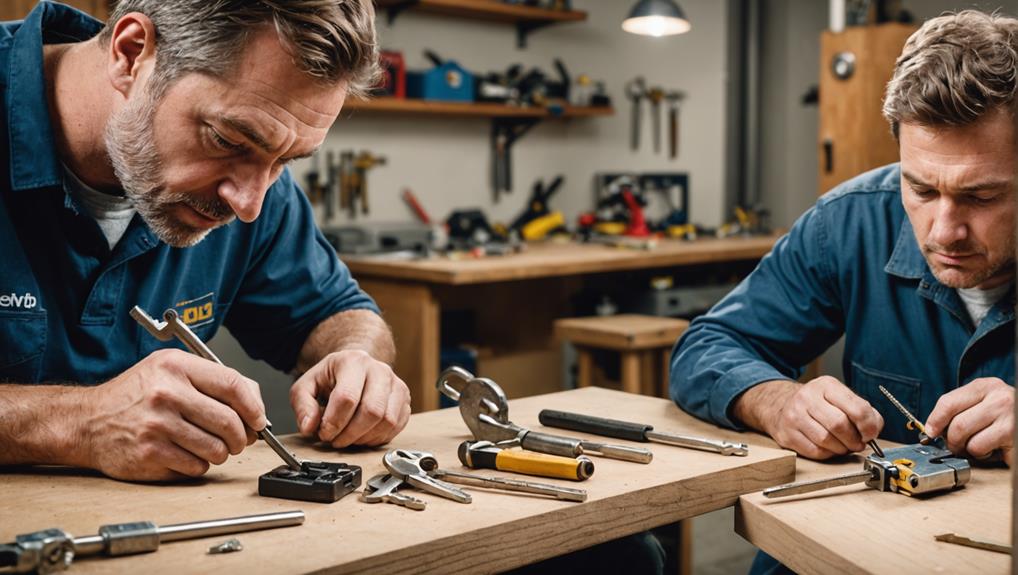
When deciding between professional and DIY re-keying, you'll want to take into account the costs involved, your skill level, and the equipment you'll need.
For instance, a detailed cost comparison between DIY and professional re-keying services can help you make an informed decision about your options cost comparison insights.
Hiring a professional can save you time and guarantee a secure result, but it often comes at a higher price.
On the other hand, attempting it yourself might be more budget-friendly, yet it requires certain tools and a bit of expertise.
Cost Comparison
Re-keying your locks can vary considerably in cost, depending on whether you opt for professional services or tackle the job yourself.
If you choose to hire a locksmith, expect to pay between $50 and $150 per lock, which covers their expertise and tools.
On the other hand, DIY re-keying can be much more affordable. You can purchase a re-keying kit for about $10 to $30, making it a budget-friendly option if you're comfortable with tools.
However, remember that saving money shouldn't undermine security or peace of mind.
Here's a quick cost comparison for you:
- Professional Services: $50 – $150 per lock
- DIY Kits: $10 – $30 each
- Time Investment: Professional may take 30 minutes; DIY could take longer if you're learning
- Future Security: Professionals guarantee proper installation, while DIY may require redoing if done incorrectly
Ultimately, consider your budget, time, and willingness to learn new skills.
Whether you serve yourself or hire a professional, re-keying your locks is a valuable investment in your safety and security.
Skill Level Required
Choosing between professional services and DIY re-keying often comes down to your skill level and comfort with tools. If you're handy and enjoy tackling home improvement projects, re-keying your locks can be a rewarding experience. You'll not only save money but also gain a sense of accomplishment in enhancing your home's security. However, it does require a steady hand and attention to detail.
On the other hand, if you're not confident in your abilities or lack experience with locks, it's wise to contemplate hiring a professional. They come equipped with the knowledge and experience to handle various lock types efficiently. This choice guarantees that your locks are re-keyed correctly, reducing the risk of issues down the line.
Ultimately, the decision hinges on how much you value your time and peace of mind versus the thrill of doing it yourself. Serving others is also a factor; if you're helping a friend or family member, you might want to think twice about whether you can deliver quality work.
Equipment Needed
To successfully re-key a lock, you'll need specific tools whether you decide to tackle the job yourself or hire a professional. If you're considering a DIY approach, make sure you have the right equipment on hand. Here's what you might need:
- Re-Keying Kit: This typically includes new pins, a key gauge, and a follower.
- Screwdriver Set: You'll require different sizes to remove the lock from its housing.
- Pliers: Essential for handling small components and removing the cylinder.
- Tweezers: Handy for placing tiny pins into the lock cylinder.
If you opt to hire a professional, they'll come equipped with all the necessary tools, saving you the hassle of purchasing them.
Professionals also have the experience to guarantee the job is done correctly, providing peace of mind.
Regardless of the route you choose, being prepared with the right equipment guarantees you can serve others by enhancing their security effectively.
Whether you're re-keying for yourself or helping a friend, having the right tools makes all the difference in achieving a successful outcome.
Frequently Asked Questions
How Long Does the Re-Keying Process Typically Take?
The re-keying process usually takes about 15 to 30 minutes, depending on the type of locks you have.
You'll want to guarantee the locksmith has the right tools and experience for the job.
After discussing your needs, they'll efficiently change the pins inside your locks, allowing you to use a new key.
It's a quick and effective way to enhance your security without replacing the entire lock system.
Can I Re-Key Any Type of Lock?
You can re-key many types of locks, but not all.
Standard pin tumbler locks are the most common for re-keying, making it easy for you to change the key without replacing the entire lock.
However, some high-security locks or electronic locks might require professional assistance or may not be re-keyable at all.
Always check the lock's specifications or consult with a locksmith to guarantee you're making the right choice for your needs.
Is Re-Keying a Secure Option for My Home?
Re-keying can be a secure option for your home, especially if you've lost a key or moved into a new place.
It allows you to change the lock's internal mechanism without replacing the entire lock, ensuring that old keys won't work anymore. This method saves you money while enhancing your security.
Just make sure to hire a qualified locksmith who can properly execute the re-keying process for maximum safety.
What Tools Are Needed for DIY Re-Keying?
If you're looking to enhance your home security by re-keying your locks yourself, you'll need a few essential tools.
Start with a re-keying kit, which usually includes a key gauge, pins, and a small screwdriver.
Let's say you've just moved into a new home and want peace of mind; having these tools will help you quickly customize your locks and guarantee they only work with your new keys.
It's a rewarding task!
Will Re-Keying Affect My Existing Keys' Compatibility?
Re-keying your locks definitely affects your existing keys' compatibility.
Once you re-key, those old keys won't work anymore, as the internal mechanism changes to match the new key configuration.
If you want to maintain access, make sure to create new keys once the process is complete.
It's a great way to enhance security, but remember to keep track of your new keys for those who need access!
Conclusion
In summary, lock re-keying offers a practical and cost-effective solution to enhance your security without the need for a complete lock replacement. By understanding the process and knowing when to re-key, you can effectively safeguard your home. Remember, while DIY re-keying can be tempting, enlisting a professional guarantees peace of mind and proper execution. Ultimately, it's not just about the locks; it's about taking control of your safety and making informed decisions for your well-being.

